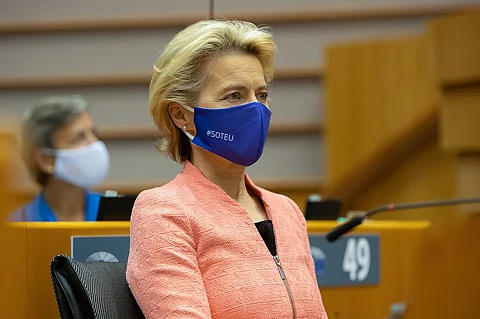

The European Court of Justice (ECJ) ruled on Wednesday that the European Commission failed to provide a credible explanation for not disclosing text messages between its president, Ursula von der Leyen, and Pfizer CEO Albert Bourla regarding COVID-19 vaccine contracts.
The court found that the Commission "has not given a plausible justification" for its inability to produce the requested documents, rejecting its claim that the messages were not retained. Under EU transparency laws, text messages concerning official business qualify as public records and must be preserved.
The ruling marks a victory for The New York Times, which first revealed the existence of the texts in 2021 and later sued the Commission after repeated denials of access.
The dispute centers on the EU’s 2001 regulation on public access to documents, which defines records as any content—including electronic messages—related to institutional decisions. The court emphasized that the Commission must conduct thorough searches and provide clear explanations if documents cannot be located.
"The Commission cannot merely state that it does not hold the requested documents," the court said. "It must offer credible explanations enabling both the public and the court to understand why they cannot be found."
The texts in question reportedly concerned negotiations for Pfizer-BioNTech’s COVID-19 vaccine, the first authorized in the EU in December 2020. Subsequent contracts in 2021 secured €2.4 billion worth of doses, with an option for 900 million more.
An EU official, speaking ahead of the ruling, defended the Commission’s handling of informal communications, stating that "it would be materially impossible to register all exchanges" given the volume of daily interactions. However, the court found the executive’s response insufficient, noting it failed to clarify whether the messages were deleted—and if so, whether intentionally or due to technical reasons.
The ruling has been hailed by transparency advocates as a critical step toward institutional accountability.
"Today’s decision is a victory for transparency in the EU," The New York Times said in a statement. "It sends a powerful message that ephemeral communications are not beyond public scrutiny."
MEP Tilly Metz (Greens/Luxembourg), who has challenged the Commission over vaccine contract secrecy, warned that opaque decision-making risks prioritizing commercial interests over public welfare. The EU Ombudsman, which previously rebuked the Commission over the case, said the judgment reinforces the necessity of proper record-keeping.
Alberto Alemanno of The Good Lobby called the ruling "everyone’s win," while Transparency International EU urged the Commission to restore public trust by ensuring full transparency.
The Commission has two months to appeal but stated it will "closely study the decision" and provide a more detailed response. "Transparency remains paramount," it said, reaffirming its commitment to legal obligations.
The case underscores growing scrutiny over EU leaders’ accountability as the bloc grapples with balancing expediency in crises with democratic oversight.